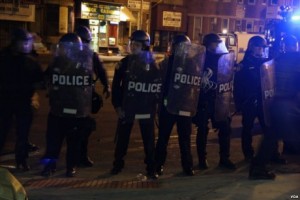I’ve written this blog about 4 times. Yet each time at its end, I hit the delete button. It was too honest. It was too raw. Most of all, for a piece on race and the church, it was waaaay to militant. And if I learned anything in my entire integrated life, nothing makes white folks more nervous than a militant black person, especially when its one of those potentially angry black women.
I can’t lie. My emotions got the best of me as I contemplated the hypocrisy of another Black History Month. Frankly, I have stopped overtly celebrating it. After all, confining my reverence and appreciation for those who have given so much for my success and access to rights that I now enjoy to a 28 day month seems as short-sighted as it is ungrateful. Nope, every time I walk into my well appointed office on campus, I am aware of the great cloud of witnesses who shed their blood and tears to enable me to write this blog from behind my beautiful desk. I bow my head daily to the fact that they never bowed their spirit to crushing odds and soul crushing oppression.
Despite my forever admiration for my foremothers and fathers, I realized that I have come to hate Black History Month.
I have come to hate it because it remains the most visible reminder of the American Church’s inability to fully engage in honest, heartfelt discourse about the role of race in our country’s past and present. I am reminded that for every 1 congregation that will sing “Lift every voice and sing” there will be hundreds and even thousands who will never sing it (much less at the right tempo) or even give bulletin space to the roles that African American have played in the American story of success.
To be sure, our inability to address race constructively in the American Church is hindered by the baggage that is brought to the discussion. Trust me, having been a part of a number of forums on race in the Church, I have listened with pained ears to many of my African American clergy colleagues, who are so ensconced in the 1960’s and 1970’s battles, that they are unable to expand the concept of race beyond a simplistic morality tale, in which all African Americans are good and all White Americans are bad. Such discursive staging only casts victims and villains and privileges old wounds over new discourse. Unable to conceive of the complicity of race in America as theorized by Mark Lawrence McPhail, these wounded warriors are unable to see the levels to which African Americans have engaged in their own dance of dysfunctionality and embrace of new strategies beyond marching and boycotts.
However, even when African Americans, come with open hands and hearts for discussion, we have to negotiate the fragile psychic terrain of our White Christian brothers and sisters, many of whom literally breakout in a cold sweat when you even point out the fact that you are an African American and might have a different opinion. Every African American, who has lived, loved, and thrived in the integrated work and social context knows that to even dare to mention race and its impact on American life, is to risk what Edward Gilbreath explains, is the possibility of offending our White colleagues in ways that have long lasting relational consequences.
Gilbreath, as he has done many times in his writing, artistically risks offense by reminding the American Church how little progress has been made in discussing race since the life of Dr. Martin Luther King, Jr.. His fantastic new book, Birmingham Revolution, holds a mirror up to the difficulty of honest discourse in America’s churches. Using the backdrop of Dr. King’s famous letter from the Birmingham jail and the historical context from which it emerged as a means to frame the dilemma for the American Church, Gilbreath exposes the dirty little secret about Race and American Christianity that Black folks have known for years; that many of our white brothers and sisters, even those of the Progressive persuasion, have not fully come to grips with nor incorporated emotionally, socially, and dare I say spiritually, Black folks who aren’t in shelters, on food stamps, or in the pictures of the next mission trip into their daily realities.
For many in the American Church, yes even the Progressive Church, race and blackness are topics and people that are to be objectified. What I mean by this is that the Church is more than happy to make African Americans the objects of their outreach; their philanthropy; or even their programmatic initiatives but rarely if ever their fully actualized discursive partners capable of self-governing thoughts. Well-intentioned saviors, swoop in often without asking, offer diagnosis and remedy, and then leave frustrated when questions are asked or critique offered. This dance of subjective-objectiveness is as frustrating for African Americans, as for our white friends. For what it does, is frame the African American not as beings with cognitive significance and abilities but as ones that are always in need, without agency or recourse, which serves only reinforces the colonialist paternalistic interests that got us into this mess in the first place.
When it comes to race, all conversation partners are not the same.
Frankly, I expect no quarter and give none to my Conservative brothers and sisters on the issue of race, particularly the 21st century variety, who know only the ideology preached by Fox News but not of the truly intellectual heavyweights like Buckley, Burke, or Locke. But more often than not, I have found their honesty refreshing, even if I question their rationale. They do not ignore race (though sometimes we wish they did) but they make it clear they will not privilege it at the expense of economics. I know where they stand and how they stand. When they embrace me and call me friend, they mean it. But they aren’t changing their ideological stance because we are friends, nor will they hide their ideological commitments to appease me. How they feel in private is how they will express it to me in public. Their racial edges are usually rough but their discourse is consistent with their actions. Which in the end is something I can respect. Affirmative Action? They are against it. President Obama? They didn’t vote for him. Trayvon? He shouldn’t have been wearing that hoodie if he was on the up and up. All of our conversations with each other are not quiet, polite, or even Christian in their tenor. Frankly, we usually agree on very little BUT we trust each other enough to be honest with each other in our disagreement and in our commitment to continue to hash it out.
Perhaps this is why I continue to celebrate LBJ as one of the truly great American presidents in our history, despite his raging bigotry, frequent and liberal use of the N-word, and numerous votes against Civil Rights legislation. The transcripts of his conversations with his Senate colleagues and in particular with Governor George Wallace, shine a light on the political calculations that forced LBJ to engage both his liberal and conservative colleagues in the sometimes offensive but equally profound conversations of a racist coming to grips with the costs of racism. They were honest. They were brutal. But they happened.
Though a Texas Hill Country racist of the highest degree, LBJ understood the pragmatic reality of race. He knew the unintended casualties of America’s racial politics—the poor white. He knew that if he failed to address race in a legislative agenda during his presidency, he not only consigned African Americans to an economic and political hell but more importantly for him, he also doomed millions of Americans for whom their white skin didn’t provide them the entry to exclusivity of the “Whiteness club”. So as much as Johnson did for African Americans with his Great Society legislation, he did the same if not more for the poor whites of Johnson Country, Texas and throughout the US. He didn’t pretend he was a great emancipator. he just knew how to be a good politician.
Unlike my respect for LBJ, my many of my more progressive friends often give me moments of pause and regret when it comes to race. They talk a wonderful game on race.They will talk about their marches, blogs, outreaches, and the 15 Rainbow stickers they have from the last Obama campaign. They talk social justice, equal rights, white privilege, and the need to get those ‘ignorant conservatives on board’, with a passion that gives you hope in the future. Yet, when the up close and personal realties of race comes knocking at their front door, they say ‘no, thank you’ and they shut the door quickly and quietly.
A perfect example of such hypocrisy is the situation of the Dallas Independent School District. Despite being one of the few solidly, Democratic strongholds in Texas, with a population that is 50% White, only 5% of the students in our schools are reflect that demographic. In a fantastic story, the Dallas Morning News (Anxiety over middle school, January 2014) revealed that Dallas Progressives were all talk, when they faced the reality of sending their children to truly integrated schools. Faced with sending their children to a neighborhood school in which they would be the minority, many so called advocates for racial justice take out second mortgages just to send their child to private schools which range from $7,000 to $40,000 a year. But when you press progressives on the incongruity of their words and actions, they offer an explanation like this one found in the paper, “Of course I will fight for better schools for ALL children,but I am not willing to risk my own child’s future by sending her to a low performing school” (which of course is the progressive code word for African American or Hispanic School).
Press them on their racialized lenses at the end of their nose, the lack of real diversity in their social inner circle my Progressive friends become hurt and outraged. If you continue to press them, you risk damaging the relationship, worse than that you get slapped with the most dangerous label in their arsenal: angry black person. The ABP label has destroyed more careers; rendered mute legitimate complaints; and shut down more healthy discourse than any other, so we potentially ABP suspects know that we better tread lightly.
Which draws me back to Gilbreath’s book. He does a masterful job of exploring the complex rhetorical interplay between a Black clergyman and his eight “moderate” White clergy colleagues. Explaining that the Birmingham Eight were at various points on the ‘moderate’ spectrum in their positions on the issues of race, he cautions against looking at them monolithically. He points out that King risked a complete break with eight men who had earlier in the year implored the Governor and other whites, to follow the new laws regarding integration of schools. He risked alienating and exposing men like Rev. Earl Stallings, who permitted African Americans at his Sunday Service and refused to throw them out as many in his congregation demanded. But as Gilbreath points out,the Birmingham Eight may have been more political than prophetic in their decision to straddle the line between social justice and moral ambiguity with their two letters:
While advocating for social change, the eight clergy men were also devoted to serving the needs of their parishioners and keeping the peace in their immediate community…they were local pastors who had to keep in mind the attitudes and interests of their congregations as well as their own personal livelihoods (p.84)
In the end, King, while equally as political and pragmatic in his response, also becomes prophetic. For by engaging in a public feud with the Southern Church and its clergy, and by extension the American Christian establishment, he exposed the Church’s inability to step into its Divine role of advocation for God’s Kingdom to come to fruition in the present age. King’s public admonition is a seminal moment for not only King but the Church because if the very organization entrusted with God’s ministry of reconciliation couldn’t engage King in an honest conversation about race, injustice, and privilege, then how could he legitimately expect the rest of American society to do so?
Interestingly enough, the Church failed King then and continues to fail us now. Despite our best efforts and initiatives to eradicate the conditions faced by undocumented immigrants; the educational challenges faced by the poor; or the inequities of justice and wealth– until we engage in the hard conversation regarding the framework that set all of these conditions in motion—the grand American concept of race–we will be still floundering like beached ideological whales 25 years from now.
To engage in hard conversations requires trust and presence, neither one of which we have in the American Church. Our way of dealing with race is to erase difference by folding it in and objectifying it. Rather than dealing plainly about fears, our biases (past and present), and admitting that race sometimes does play a role in our approach to ministry, we render it totally invisible. Sadly, it is the tendency to make race invisible that is most damning for any chance at honest reconciliation. For erasure is the greatest form of dehumanization in a symbolic culture—for it communicates the belief the object being erased is not viable for productive service nor is it worthy to remembered much less esteemed.
So if you haven’t had a chance to celebrate Black History month or preached a sermon on racial reconciliation, don’t worry I am not offended. Just like I hope you won’t be offended the next time I laugh out loud when you tell me about your Christian commitment to social justice and open discourse.
Read more reflections on Black History Month at Patheos here.











